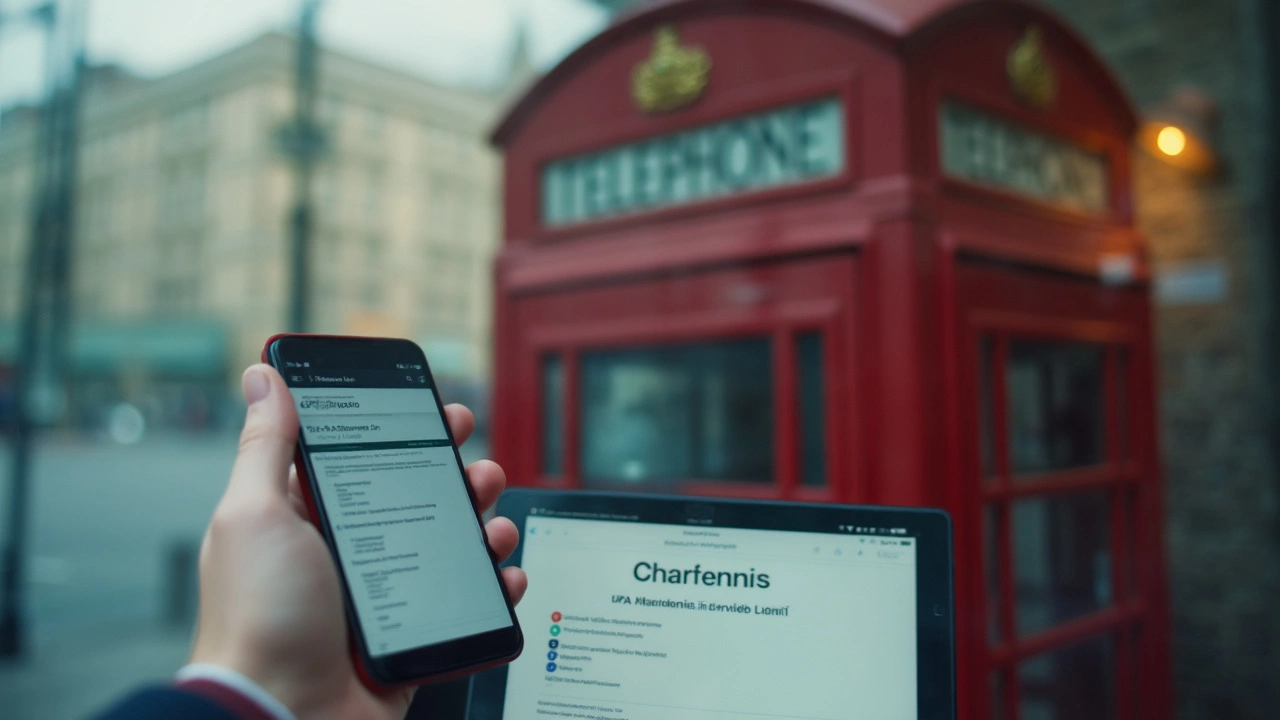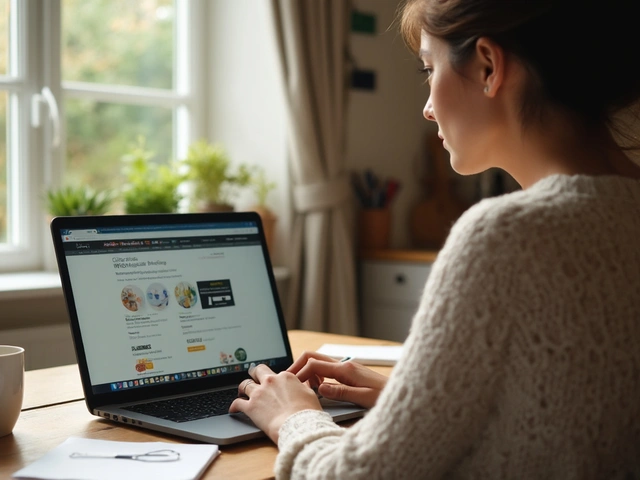Why Verifying a Canadian Online Pharmacy is So Important
Skipping the pharmacy drive-thru sounds great, but online meds aren’t always as safe as they should be. Scams, counterfeits, and shady operations are everywhere. In Canada, legit online pharmacies are tightly regulated—and there are real ways to check if you’re actually dealing with one. Imagine paying full price and getting sugar pills, or worse, something dangerous. Verifying a Canadian pharmacy does a lot more than give peace of mind; it protects your health, your wallet, and maybe even your privacy.
According to Health Canada, around half of the world’s fake meds come from unsafe online stores. That’s wild. It’s not even rare for counterfeiters to make sites that look real—they’ll steal logos, doctor reviews, even invent professional-looking verifications. But there’s a catch: Canadian pharmacy watchdog groups have laid down smart ways to spot the fakes. Knowing what to look for isn’t just smart; it’s basic survival in the jungle of online pharmacies.
One way to start is by looking for the CIPA (Canadian International Pharmacy Association) stamp. CIPA’s not just a buzzword—this group only lets in licensed Canadian pharmacies that stick to strict safety rules. If a pharmacy claims to be a member but isn’t on the CIPA website, that’s a dead giveaway. Statistics from the National Association of Boards of Pharmacy show that only about 3% of online pharmacies actually follow safety and legal guidelines. That means 97% are sketchy.
But CIPA is just the beginning. Domain records show who’s really behind a website, when it started, and whether it’s flying under the radar. A legit domain has history—fly-by-night scammers often pop up with brand-new web addresses or ones that jump around.
Think you’re too smart to get fooled? Some of these sites will even send out real drugs for a while, then swap to counterfeits once you trust them. Knowing how to cross-check a pharmacy—from CIPA to domain details—is just as important as locking your front door. The tips and steps here are your best shot to steer clear of trouble, get real meds, and actually save money.
How to Cross-Check CIPA Membership: A Closer Look
If the pharmacy isn’t CIPA-verified, turn and run. That simple. Most real Canadian pharmacies that ship to the U.S. and overseas do this—CIPA’s been around since 2002 and has become the actual gold standard for pharmacy safety in Canada. Here’s your step-by-step to check it like a pro.
- Go to CIPA’s official website: Open up www.cipa.com. Don’t trust just the logos pasted on pharmacy sites—those can be copied in two clicks.
- Find the member list: CIPA has a ‘Members’ section with a live, searchable list of every legit pharmacy in its circle.
- Enter the pharmacy’s name or website: Always check the exact spelling. Scammers love tiny changes, like replacing an “l” with a capital “I.”
- Click for more details: Each real CIPA member has a profile with their contact info, business name, and, crucially, their website URL. If any of this doesn’t match what’s on the pharmacy site, be suspicious.
- If it’s not listed, it’s not CIPA: No member listing, no CIPA credentials. They can’t join for just a day or fudge the list. Simple as that.
Let’s talk red flags. If a site’s CIPA badge isn’t clickable, or if it leads anywhere except the official CIPA profile, take that as a giant warning sign. Real pharmacies WANT you to double-check. They’ve got nothing to hide, and the direct link from their CIPA badge to the certification listing on cipa.com is a must.
Now, you’ll sometimes find legit sites that just forgot to update their badge. When in doubt, use the search bar on CIPA’s site—never trust screenshots, weird certificates, or vague claims. Sometimes, sites will even show other official-sounding credentials, like PharmacyChecker or LegitScript. These can help, but for Canadian meds, CIPA is the name to trust.
Here’s a tip: some of the safest pharmacies are super transparent about their CIPA certification and will add direct call-outs, links, and sometimes even short videos walking you through what CIPA is and why you should care. They want informed customers, not drive-by buyers.
Also, keep an eye out for customer reviews mentioning CIPA. These usually mean the pharmacy’s doing a good job of advertising its safety record—but remember, even fake sites can pay for fake reviews. When you see hundreds of nearly identical, generic reviews, get skeptical fast.
Double-check all pharmacy names, even in your browser bar. Scammers sometimes make “lookalike” URLs (like canadadrugwarehouse-shop.com instead of canadadrugwarehouse.com), hoping you won’t notice. One place you can get help with certainty is in blog roundups that vet pharmacy safety for you and explain how to verify canadadrugwarehouse.com and similar providers. Reading those can save a lot of second guessing.

Looking Up Domain Records: The Detective Work That Matters
You might never have thought to check who owns a website, but this trick blows up a lot of pharmacy scams in seconds. Each web address is like a digital fingerprint—showing exactly when the site went live, who registered it, and sometimes even where they’re operating from.
Why does this matter? According to ICANN, sites used for phishing or selling fakes rarely last long. Scammers pick up fresh domains, copy a design, and start pushing spammed ads. Once they get banned, they start over. Legitimate pharmacies usually have domains that go back years, and all their details match up with what they publish publicly.
Here’s how to pull up the dirt:
- Type “WHOIS lookup” into your search bar. There are dozens of free tools, like whois.domaintools.com or who.is. If you want to see it like registrars do, use the one from ICANN itself.
- Paste the pharmacy’s domain name. Just the web address, nothing extra: for example, “canadadrugwarehouse.com.”
- Check the date registered. Was the domain created last week? That’s not a good look. Genuine pharmacies usually have at least a year or two on the clock, if not much longer.
- Match the owner’s name and country. Most legal Canadian pharmacies list their business info—if the WHOIS record hides ownership (via a privacy service) but claims to be Canadian, take extra care. Sometimes big businesses do use privacy services, but stealth on critical info should ring alarm bells.
- Does the domain match the business? If the pharmacy calls itself “Canadian Drug Warehouse” but the domain is registered to something like “Hongkong Superfast Ltd,” that’s a hard pass.
Pay attention to the registry country. Real Canadian pharmacies operating in Canada should show a connection to Canada, even if there’s a privacy guard. Many scammers operate out of tiny Caribbean islands, Eastern Europe, or other places where regulators can’t reach them.
Some people get confused when a pharmacy site uses privacy protection (domain privacy shields identities). That alone isn’t always a dealbreaker—just cross-reference what you find here with what CIPA and customer reviews say. It’s the combo of details that matters.
There’s one more step: If the WHOIS record spits out an email or a corporate registrant, do a quick search on that name or email. Sometimes all it takes is one search to find a history of scams, lawsuits, or lots of other pharmacy sites popping up and going down. Pay attention to patterns—dozens of “new” pharmacy sites sharing the same contact info is a clear scam ring.
Here’s an extra trick: hit up archive.org (the Wayback Machine) to see how a site looked a few years ago. If it just appeared or has changed hands a lot, that’s worth knowing. Long-running, stable pharmacy sites very rarely get repurposed or rebranded out of nowhere. If you have time, this sleuthing is worth its weight in gold.
Smart Tips for Online Pharmacy Safety: Beyond Just CIPA and Domain Checks
Checking for CIPA membership and domain age takes care of the big stuff, but sometimes the devil’s in the details. Here are some tips even seasoned buyers forget:
- Pricing too good to be true? If you see prices way lower than regular Canadian pharmacies (which are already way cheaper than the U.S.), hit pause. Real CIPA pharmacies negotiate for big discounts, but nobody’s giving away $1 Viagra pills if they’re actually real.
- Look for real contact info: Genuine pharmacies are required to list a real Canadian address and a working phone number. Try calling or emailing before buying—how fast and how well they respond will tell you a lot.
- Demand a prescription: Any real Canadian online pharmacy will ask for a prescription from a licensed doctor. If they’ll ship anything without one, stay away. No scripts, no sale.
- Watch for secure checkout: Look for “https” in the web address and a locked padlock symbol. If the checkout page isn’t secure, your payment info is at risk. And don’t trust sites that only take weird forms of payment, like money orders or crypto—legit pharmacies usually accept credit cards.
- Know the review landscape: Use third-party review sites to check feedback. Check for any reports of no delivery, fake meds, or credit card fraud. But beware of review stuffing—if it looks fake, it probably is.
- Cross-check on different pharmacy watchdogs: For U.S. shoppers, check for VIPPS (Verified Internet Pharmacy Practice Sites). LegitScript is a good bonus check too. For Canadian shoppers, CIPA reigns supreme, but the more verifications, the better.
- Compare your packaging: When the drugs show up, they should always be in factory-sealed packages, with instructions and detailed labeling. Many fake sites ship loose pills in unmarked bottles—never take those.
- Trust your gut: Professional websites, responsive service, and transparent history all add up. If anything feels “off,” take your business elsewhere.
And here’s one more thing: Pay attention to public records. The Pharmacy Examining Board of Canada makes it easy to check if a pharmacist is licensed. If your online pharmacy lists team members or a chief pharmacist, look up their credentials with your province’s regulatory body. If they’re not listed, that’s a problem.
Pharmacy shopping online isn’t rocket science, but it’s not a coin toss either. Armed with these steps, you can trust the system—which is a relief when meds cost what they do these days. There’s zero reason to risk health or money when checking a few details gives solid security. And if you ever stumble across a site you’re unsure about, run through the full process: CIPA list, domain checks, and a little social sleuthing.
Don’t put your body or budget on the line—use these checks like a lock on your medicine cabinet. Safe, simple, and about as complicated as checking your locks before heading to bed.





lisa zebastian
May 5, 2025 at 21:31Let’s be real-CIPA’s just a front for Big Pharma’s lobbying arm. The real regulators? Health Canada’s been captured since 2008. The WHOIS records? All obfuscated through shell companies tied to the same offshore data center in Belize. And don’t get me started on the ‘secure checkout’ myth-HTTPS doesn’t mean squat if the SSL cert is self-signed by a shell corp registered to ‘John Smith, Toronto.’ The entire system’s a honeypot to funnel your data into the NIST biometric database. You think you’re saving money? You’re just funding the surveillance state. Read the CIPA bylaws-they’re written in legalese so dense even the FTC can’t parse it.
Jessie Bellen
May 5, 2025 at 22:06Stop. Just stop. If it’s not on the CIPA list, it’s a death trap. No exceptions. No ‘maybe.’ You’re not ‘being careful,’ you’re just delaying the inevitable. I’ve seen people die from fake blood pressure meds bought because they ‘trusted the logo.’
Jasmine Kara
May 6, 2025 at 22:31hey i just tried to check a site and i think i did it right but idk if the domain was legit? i used whois and it said registered in 2020 but the owner was hidden? i called them and the lady sounded nice but her accent was weird? idk im just scared now lol
Richie Lasit
May 8, 2025 at 12:39Hey Jasmine, you’re not alone-this stuff is overwhelming. The good news? You’re already ahead by asking. CIPA’s your best friend. If the domain’s older than 2 years and the phone number rings to a real Canadian office? You’re golden. And if the site actually asks for your Rx? That’s the golden ticket. Don’t let fear paralyze you-just take it step by step. You got this.
arthur ball
May 9, 2025 at 23:03OMG I just checked my last pharmacy and their domain was registered LAST MONTH?? I’m so mad at myself. I thought they were legit because the site looked so professional. Like, the fonts were nice, the photos had models holding pills like they were perfume. But WHOIS? Total ghost town. I’m deleting my cart right now. Also-CIPA? I didn’t even know that was a thing. Thank you OP. You just saved my life. I’m gonna print this out and tape it to my fridge. 🙏💊
Harrison Dearing
May 11, 2025 at 22:17Can we talk about how these scam sites have the exact same ‘customer testimonials’? I swear, every one has ‘Sarah from Calgary’ saying ‘Best experience ever!’ and ‘I saved $200!’ in the exact same font. It’s like they bought a template from Fiverr. Also-why do they always use the same stock photo of a smiling grandma holding a pill bottle? I’ve seen that woman in 17 different pharmacies. She’s clearly a bot. 👀
Justice Ward
May 12, 2025 at 23:37There’s something beautiful about how simple this is. You don’t need a degree in cybersecurity-you need a browser, five minutes, and the willingness to not trust the pretty pictures. CIPA’s a living, breathing list. WHOIS is public record. A prescription? Non-negotiable. It’s not about being paranoid. It’s about being a human who values their own body. The fact that we have to do this at all? That’s the tragedy. But the tools? They’re right there. Just click. Just check. Just care.
bhuvanesh kankani
May 13, 2025 at 12:58While the article provides a comprehensive guide for Canadian pharmacy verification, it is worth noting that similar regulatory frameworks exist in other jurisdictions. In India, the National Pharmaceutical Pricing Authority (NPPA) and the Central Drugs Standard Control Organization (CDSCO) maintain lists of licensed online vendors. Cross-referencing with these authorities, when applicable, adds an additional layer of security for global consumers. Vigilance remains universal.
maria norman
May 15, 2025 at 01:33So we’re supposed to trust a nonprofit that’s funded by… who? The same pharmacies it’s ‘certifying’? How is that not a conflict of interest dressed up in a lab coat? And the ‘gold standard’? That’s just branding. The real gold standard is a doctor who knows your medical history and a pharmacy that doesn’t require you to submit your social security number to buy insulin. But hey, at least we’ve got a clickable badge.
Iris Schaper
May 16, 2025 at 07:54i read this and i was like wow this is so helpful but then i looked up the cipa site and it had a typo in the url in the footer. like it said cipa.con instead of .com. so now i dont know if the whole thing is fake lol
katerine rose
May 18, 2025 at 01:36Who cares about CIPA or WHOIS if you’re buying from Canada anyway? They’re all the same. I’ve been getting my meds from the same site for 6 years. It works. My blood pressure’s stable. Stop overthinking it. You’re not a spy. Just click buy and move on
Selma Cey
May 19, 2025 at 20:28If you believe in verification systems, you also believe in the myth of control. The system isn’t designed to protect you-it’s designed to make you feel safe while the real power operates in the shadows. The CIPA stamp? A placebo for the anxious middle class. The domain age? Just a delay tactic. The prescription? A bureaucratic ritual. You’re not securing your health-you’re performing compliance.
Francis Pascoe
May 21, 2025 at 01:55THIS IS WHY AMERICA IS BROKEN. You people actually think a Canadian website is safe? You think a ‘CIPA’ badge means anything? You’re letting foreigners control your medicine supply. That’s not safety-that’s surrender. If you want real drugs, go to a REAL American pharmacy. Or better yet-get your meds from a doctor who doesn’t outsource to some guy in a basement in Vancouver. This article is treason.
Richa Shukla
May 22, 2025 at 01:01lol i tried the whois thing and it said domain was registered in 2015 but the owner was ‘private’ so i just gave up. also the site had a .ca domain so i figured it was fine? i ordered 3 bottles and got a box of glitter and a coupon for a vape pen. thanks for nothing
Chris Rowe
May 23, 2025 at 05:41why are you all stressing? i bought from a site that had no cipa, domain was 3 months old, and the email was gmail. got my pills. they worked. my anxiety gone. now i just order from whoever has the lowest price. you’re all overthinking. life’s short. take the pill.
Sushmita S
May 24, 2025 at 20:32OMG I just checked my pharmacy and they’re CIPA listed!! 😭💖 I cried. Like, actual tears. I thought I was gonna die from high blood pressure and now I’m safe. Thank you for this guide. I’m telling my whole family. 💊🙏
AnneMarie Carroll
May 25, 2025 at 09:08Oh please. You think CIPA is the solution? You’re ignoring the fact that they’re funded by the same conglomerates that control the FDA. This is just a PR stunt to make you feel better while they raise prices 300% next quarter. And WHOIS? Please. They’ve been masking ownership since 2003. You’re not protecting yourself-you’re performing digital obedience.
John K
May 26, 2025 at 12:02USA ONLY. NO CANADA. NO FOREIGN PHARMACIES. THEY’RE ALL SCAMS. THEY’RE ALL HACKERS. THEY’RE ALL TRYING TO STEAL YOUR DATA. BUY FROM AMERICAN PHARMACIES OR DON’T BUY AT ALL. #AMERICAFIRST #TRUSTUSA
Laura Anderson
May 27, 2025 at 09:19It’s fascinating how we’ve turned medical safety into a checklist ritual. We’re not verifying pharmacies-we’re verifying our own ability to follow instructions. The real question isn’t whether the site is CIPA-certified-it’s why we’ve been forced into this labyrinth of verification in the first place. The system doesn’t trust us. So we trust the badge. And the badge? It’s just a mirror.